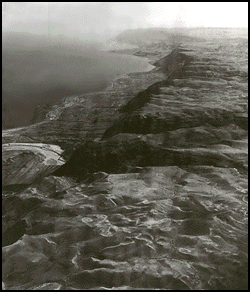
Future change in rainfall patterns may be far more sweeping than has been predicted by current models, according to an Institute study reported in Climatic Change. The study was conducted by the late Prof. Mordeckai Magaritz, who pioneered environmental research at the Weizmann Institute. It shows that significant fluctuations in rainfall levels have taken place over the last 7,000 years, and that they cannot be explained by existing climatic models. Changes in the future, therefore may be far greater than such models have forecasted.
Prof. Magaritz compared variations in precipitation over the past 7,000 years as reflected in four paleoclimatic records: 1. the advance and retreat of Alpine glaciers; 2. the width of salt-cave passages in Mt. Sodom, overlooking the Dead Sea; 3. oxygen isotope compositions of mollusk shells from the eastern Mediterranean; and 4. the size of Lake Chad in Africa. He found that throughout this period, large cyclical changes in precipitation occurred simultaneously in all these regions.
This cyclical pattern cannot be explained by existing climatic models, which are based almost exclusively on changes in factors such as the temperature and the concentration of gases in the atmosphere - elements believed to have remained relatively constant during the period under study. Moreover, major decreases in precipitation took place within spans of only several hundred years, whereas the atmospheric factors underlying climatic change models ordinarily require thousands of years to make a tangible impact.
The fact that natural variability in rainfall is much larger than expected also implies that it will be difficult to know whether future changes in precipitation are caused by human contamination of the atmosphere or by natural variations. Prof. Magaritz suggested designing precipitation models that will take into consideration interactions between systems with a short response time, such as the influence of the oceans on water in the atmosphere and the balance of heat between the two.
Prof. Magaritz, who was the incumbent of the Barry Rymer Chair for Environmental Research, passed away in September after a lengthy illness.

